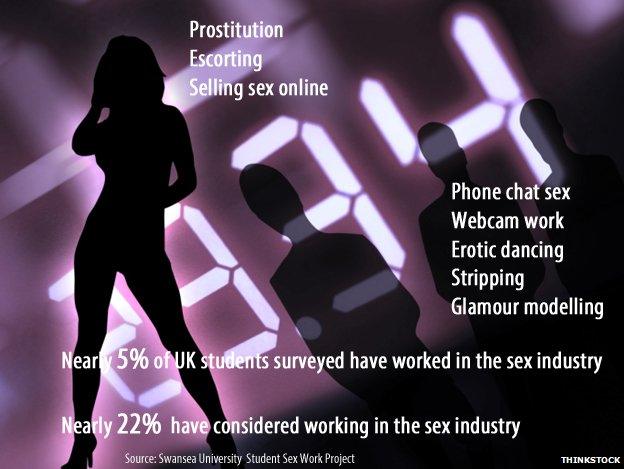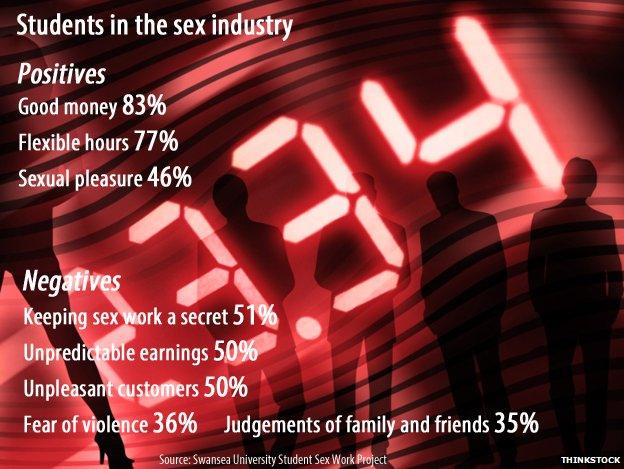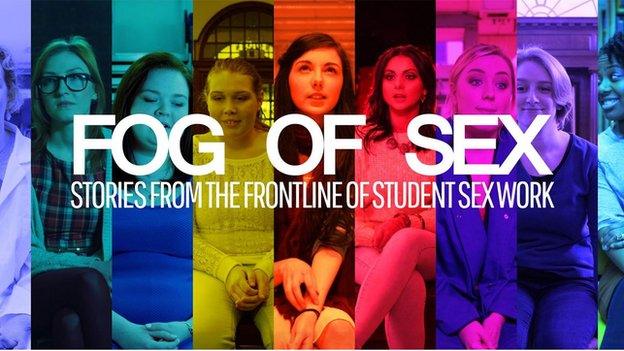22% of students consider sex work - Swansea University study
- Published

The types of sex work and those students considering it
More than a fifth of students have thought about being involved in the sex industry, according to a major research project.
About 6,750 students from across the UK took part in an online study by Swansea University.
It claims nearly 5% of them had actually worked in the sex industry and male students were more likely to become involved than women.
Work ranged from stripping, phone sex chat, erotic dancing to prostitution.
It included escort work but also work, which did not involve direct contact, such as webcam work and glamour modelling.
The Student Sex Work Project, external was carried out by Swansea University's Centre for Criminal Justice and Criminology and funded by the Big Lottery Fund.
The findings suggest:
Nearly two thirds were motivated to earn money to fund a lifestyle, but 45% wanted to avoid debt
59% thought they would enjoy the work, 54% were "curious," 45% wanted to work in the industry and 44% were motivated by sexual pleasure.
Of those who had worked, more than half was for less than six months, or for less than five hours a week
Some 76% of students engaged in the sex industry reported that they felt safe in their work "always" or "very often" but 49% involved in direct sex work had a fear of violence

Positives and negatives for working in the sex industry, as found by the study
Dr Tracey Sagar, who co-led the study, said stereotyping was a problem and the discovery that more men were involved in the sex industry than was commonly thought was a "significant finding".
Although only a third of those researched were men, of those taking part in the survey, 5% said they were involved in sex work, compared to nearly 3.5% of the women.
"Sex work is widely but wrongly perceived to be an occupation that is predominantly taken up by women and this means that males may fall through the student support net because they are not associated with sex work occupations," she said.
'More complex'
Dr Tracey Sagar, who co-led the study, said for most students it was about making ends meet
Dr Sagar said: "We now have firm evidence that students are engaged in the sex industry across the UK.
"The majority of these students keep their occupations secret and this is because of social stigma and fears of being judged by family and friends. And, we have to keep in mind that not all students engaged in the industry are safe or feel safe."
She said it was vital universities better understood student sex work issues.
Steve Jones, director at Terrence Higgins Trust Cymru, said students needed support to ensure they had the knowledge and confidence to protect themselves from sexually transmitted infections.
"It has long been the assumption that young people who enter the sex industry do so to fund basic living expenses.
"However, this research shows young people's reasons for entering sex work, and their motivations for remaining in it, are more complex."
Rosie Inman, NUS Wales women's officer said the study was a valuable piece of research.
"The main priority must be to maintain the wellbeing of students involved in sex work, not to stigmatise them," she said.
The study was carried out online. The research started in Wales and nearly half of those who took part were at Welsh colleges.
- Published27 March 2015

- Published27 March 2015
